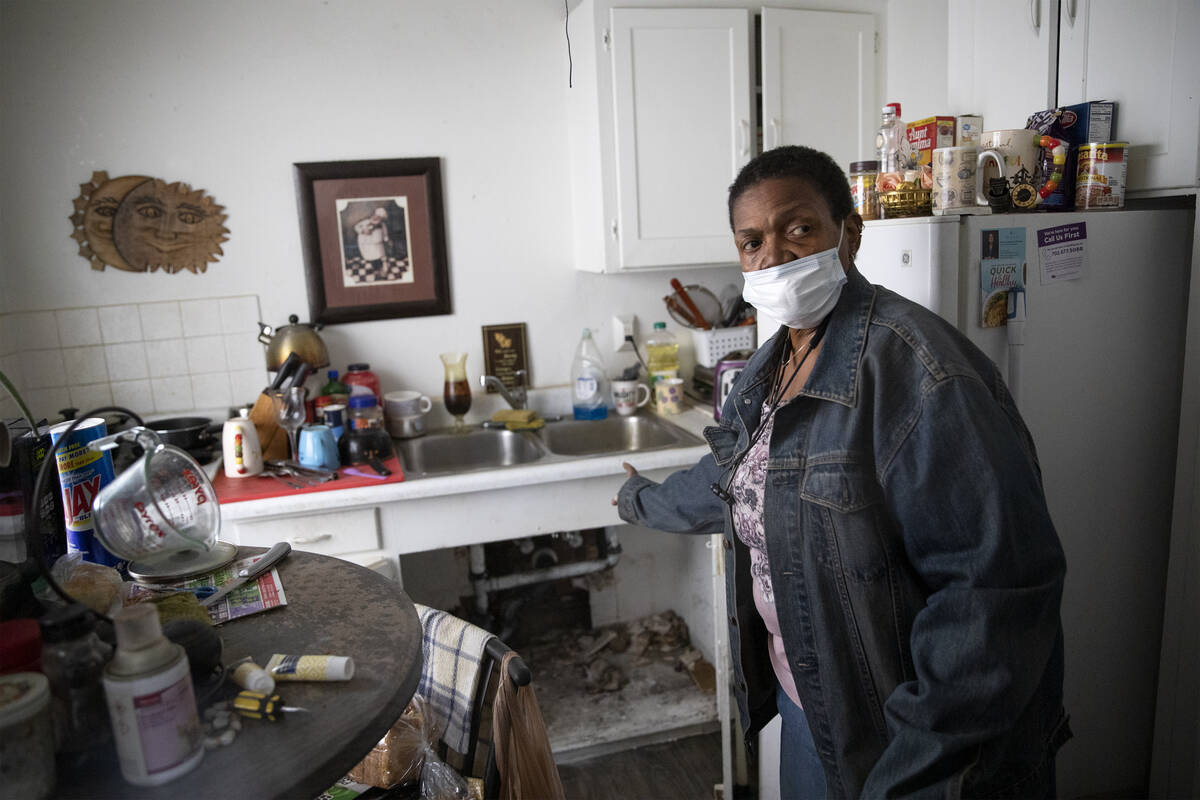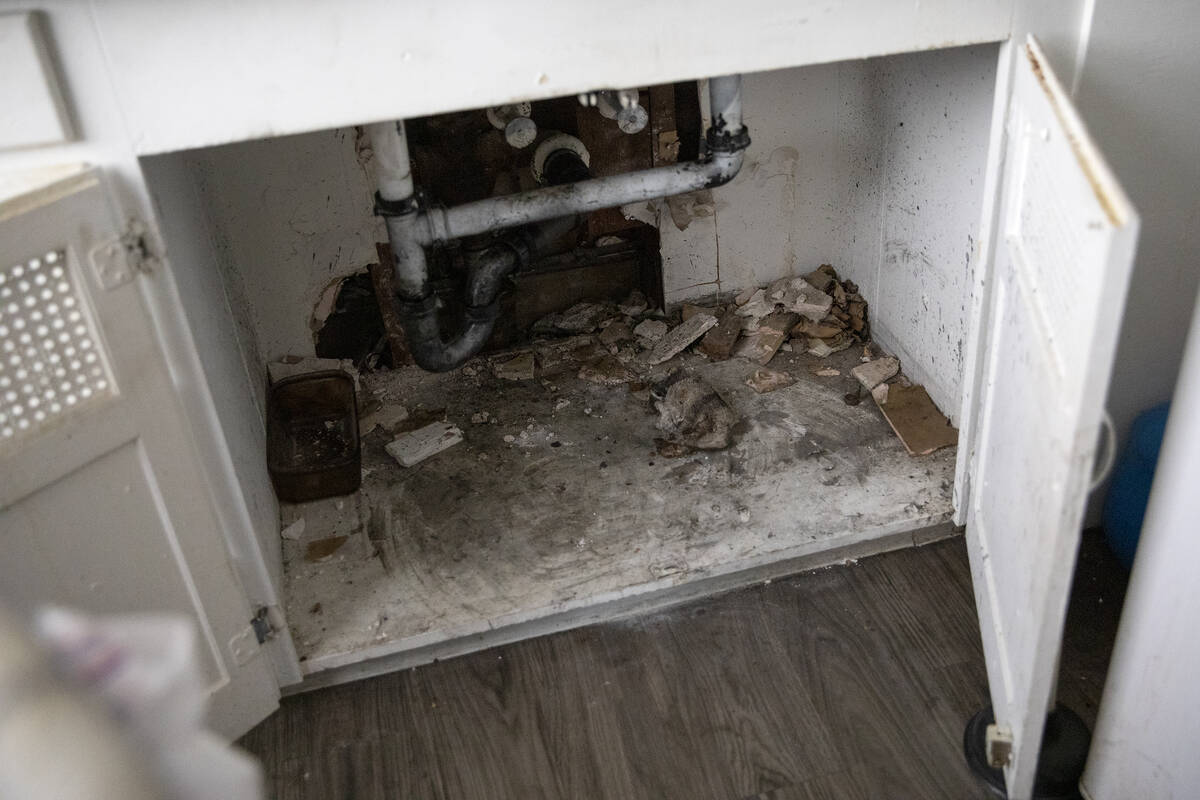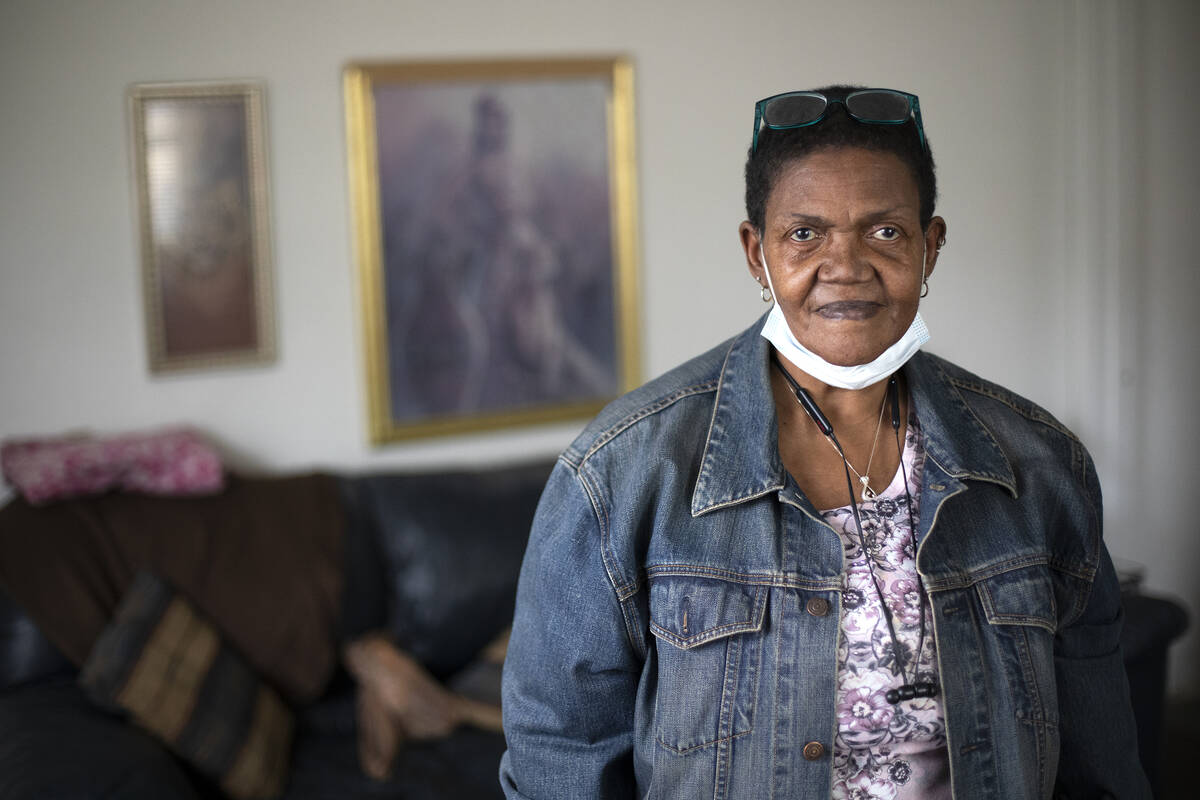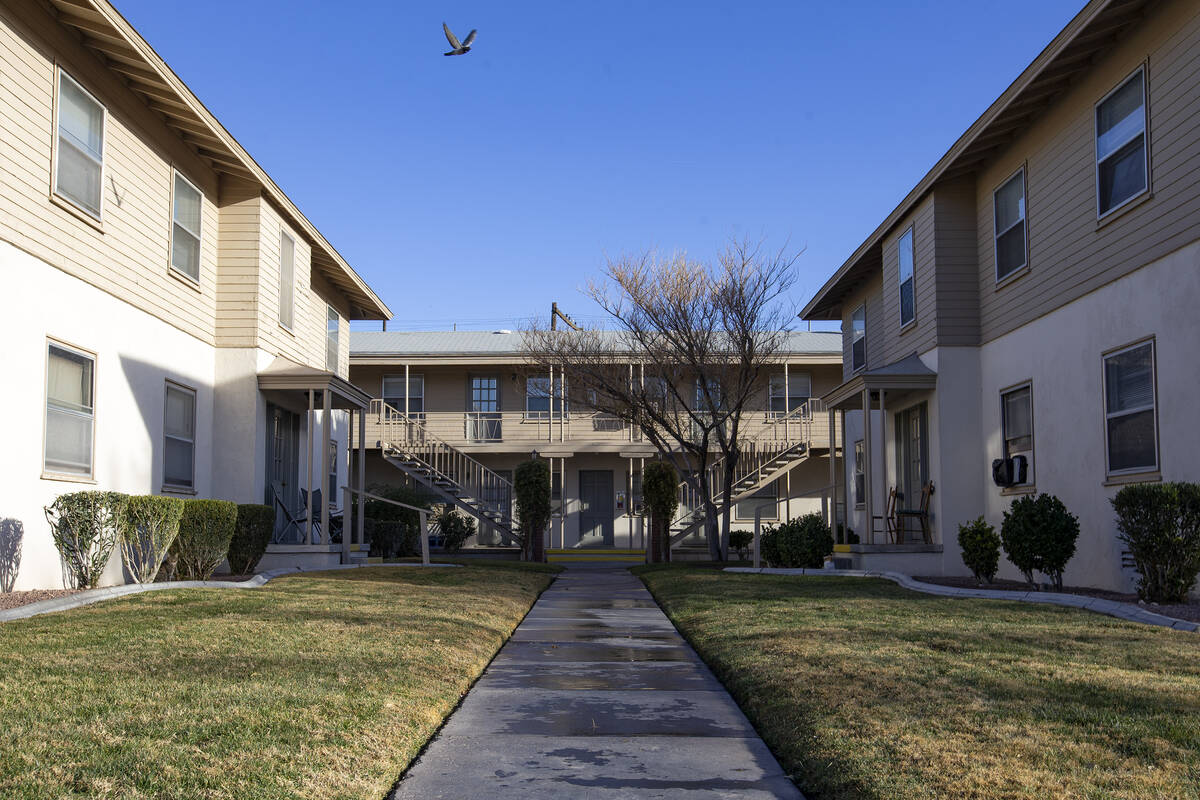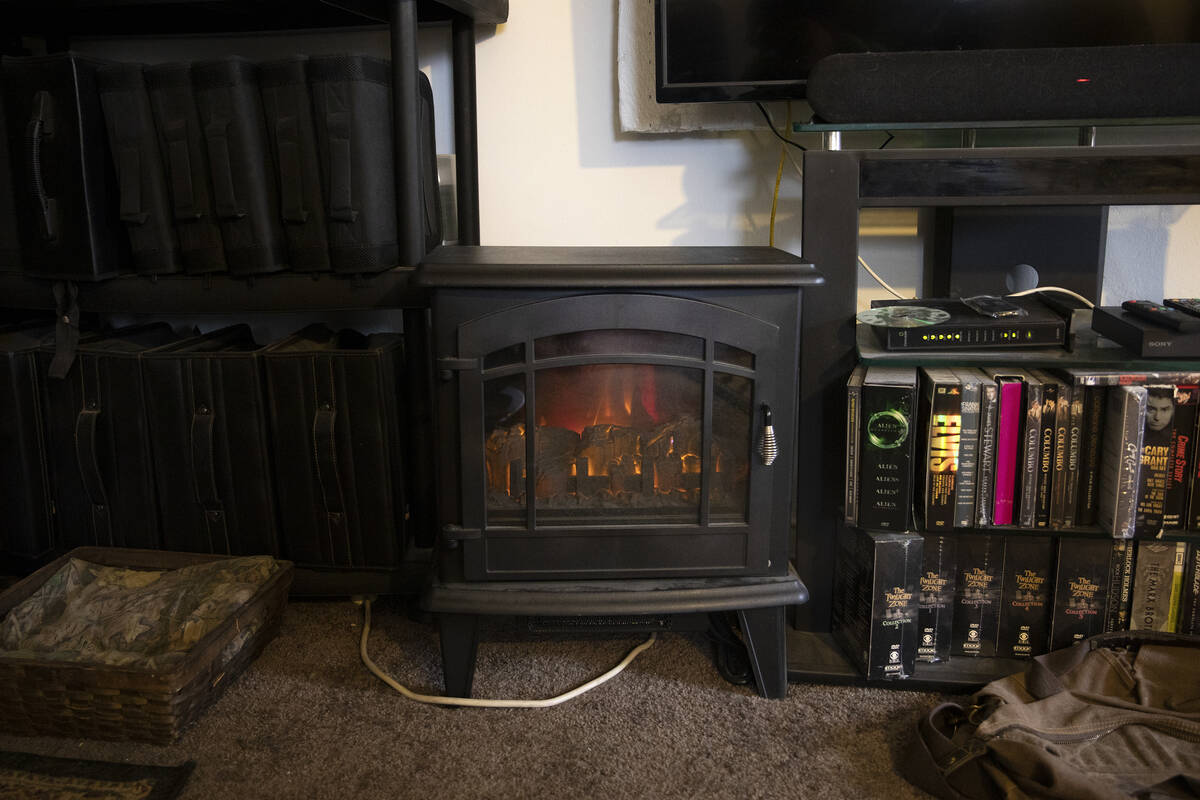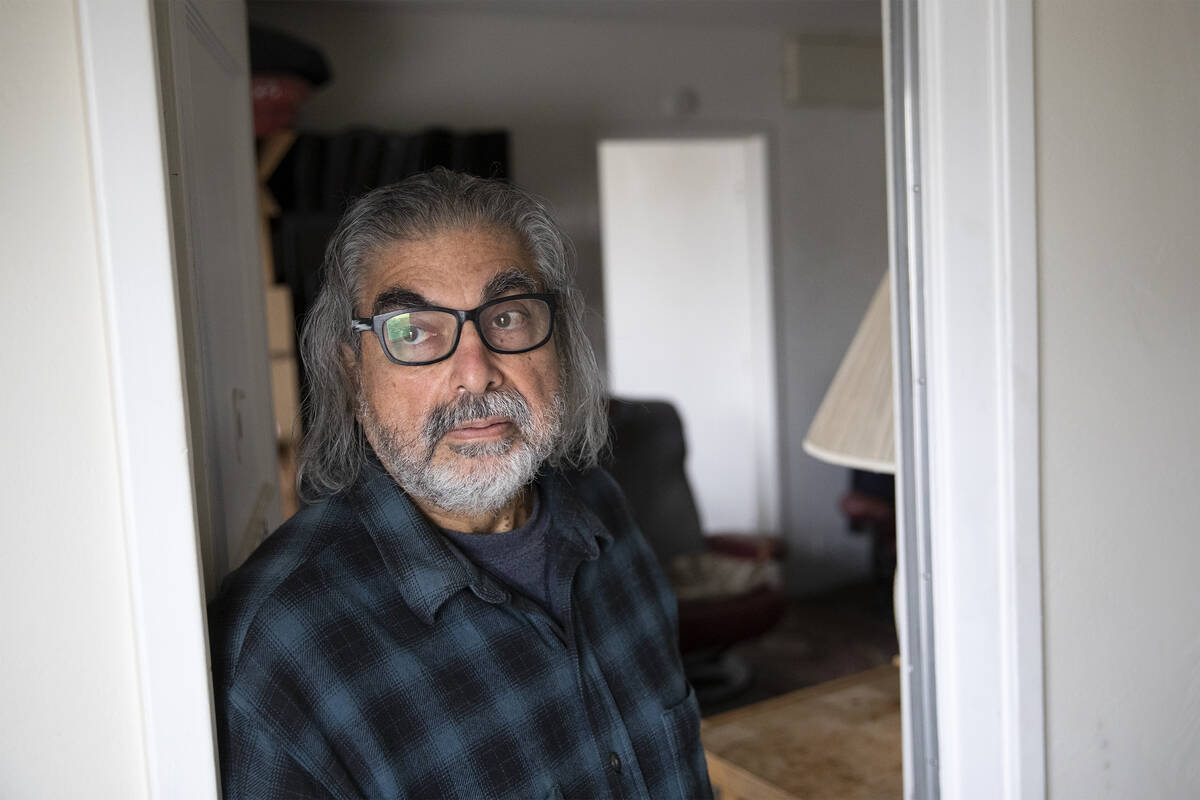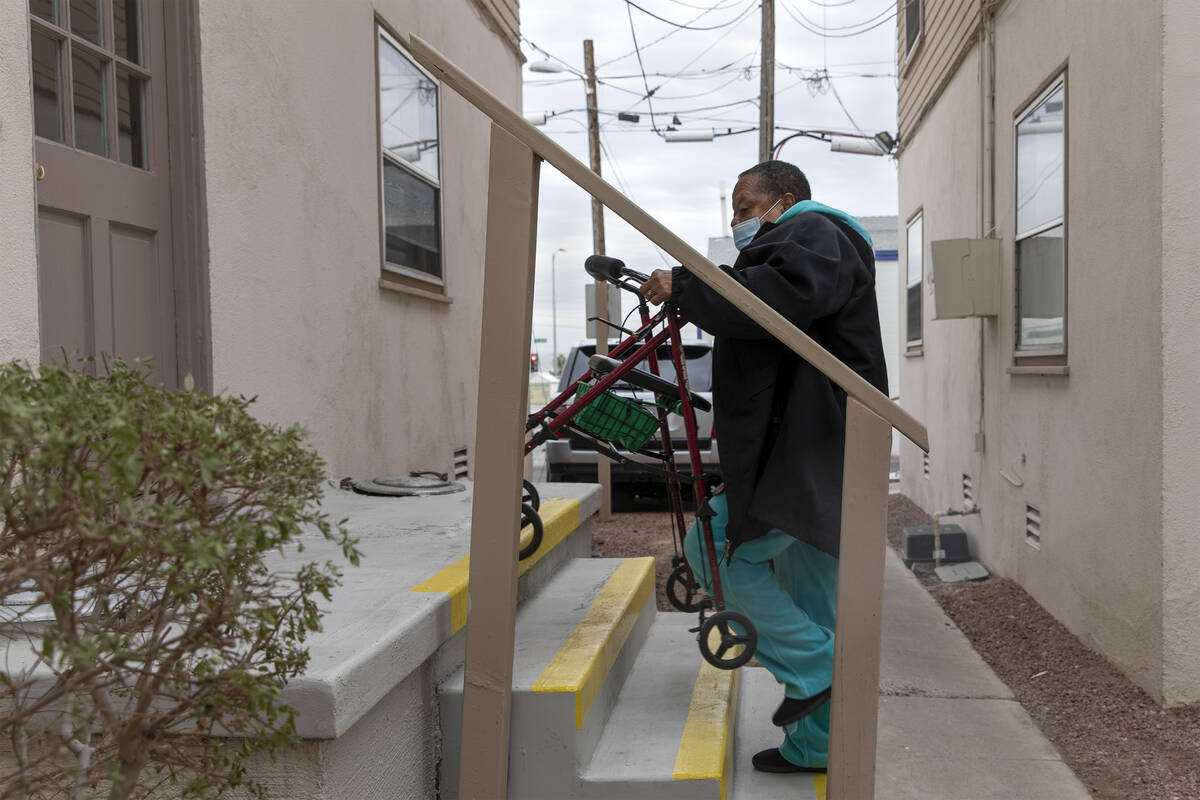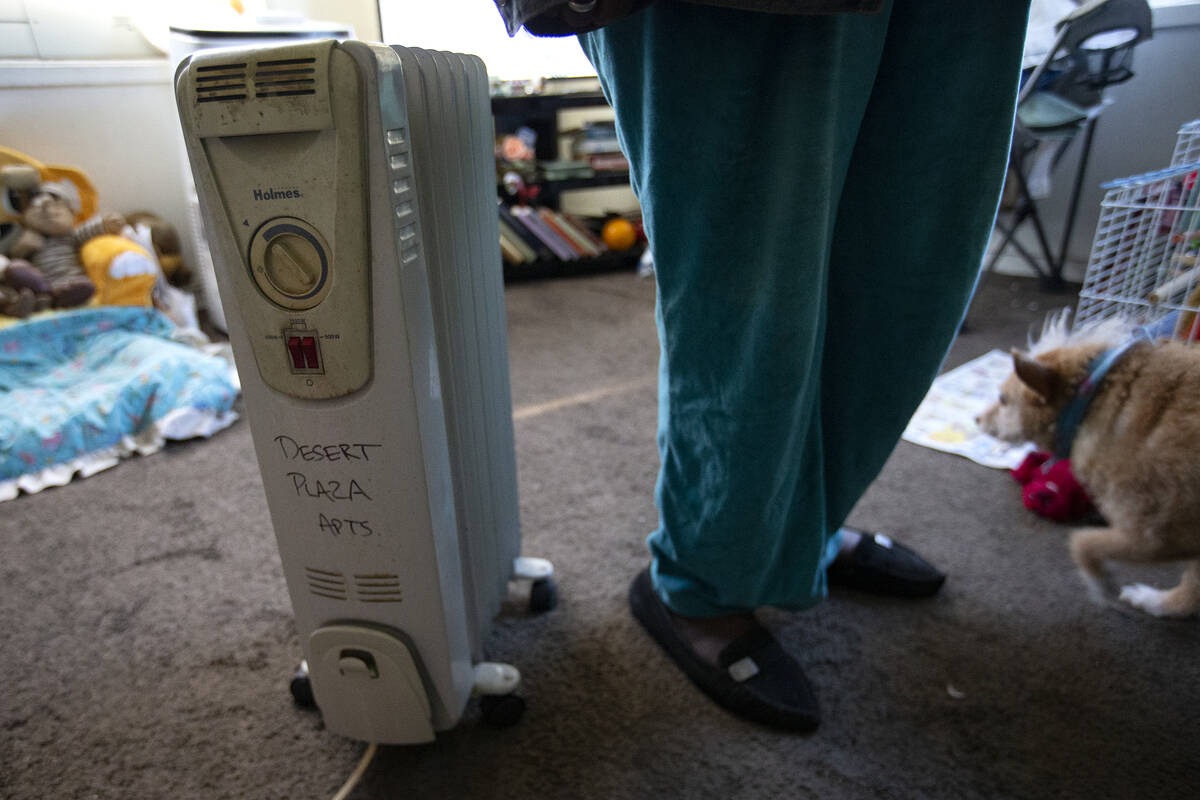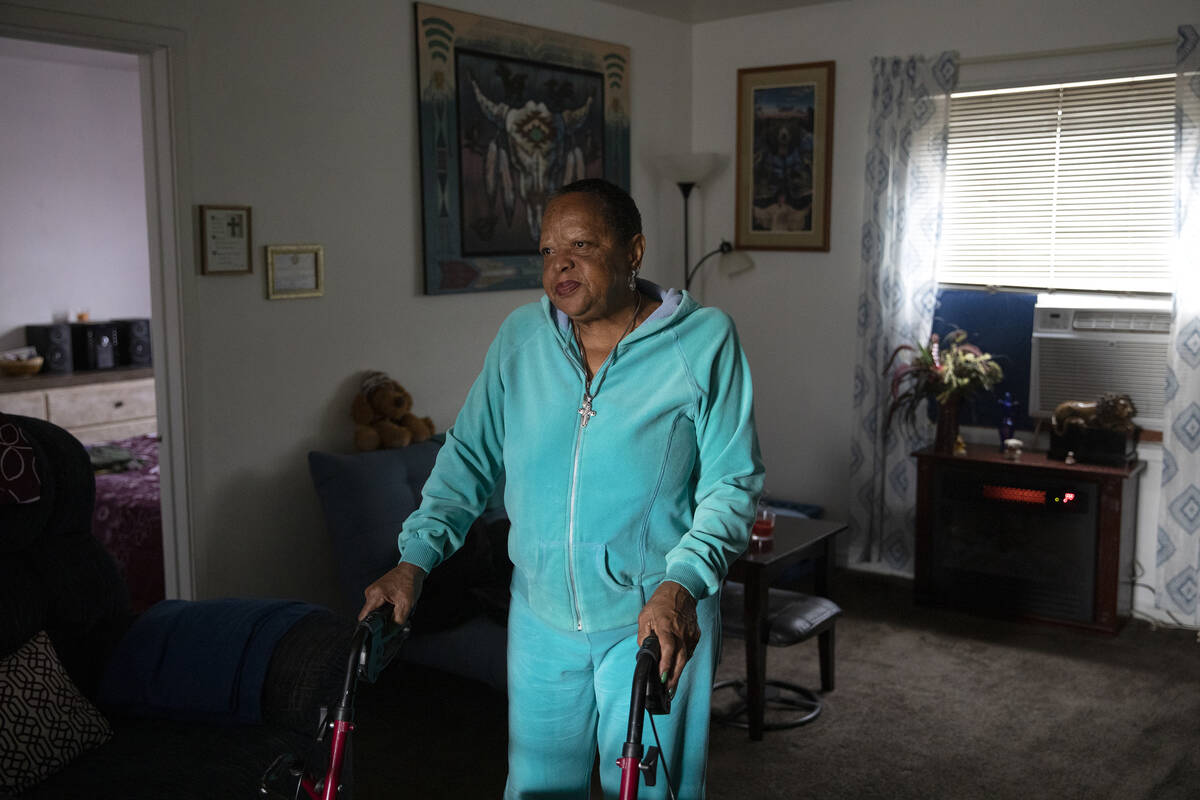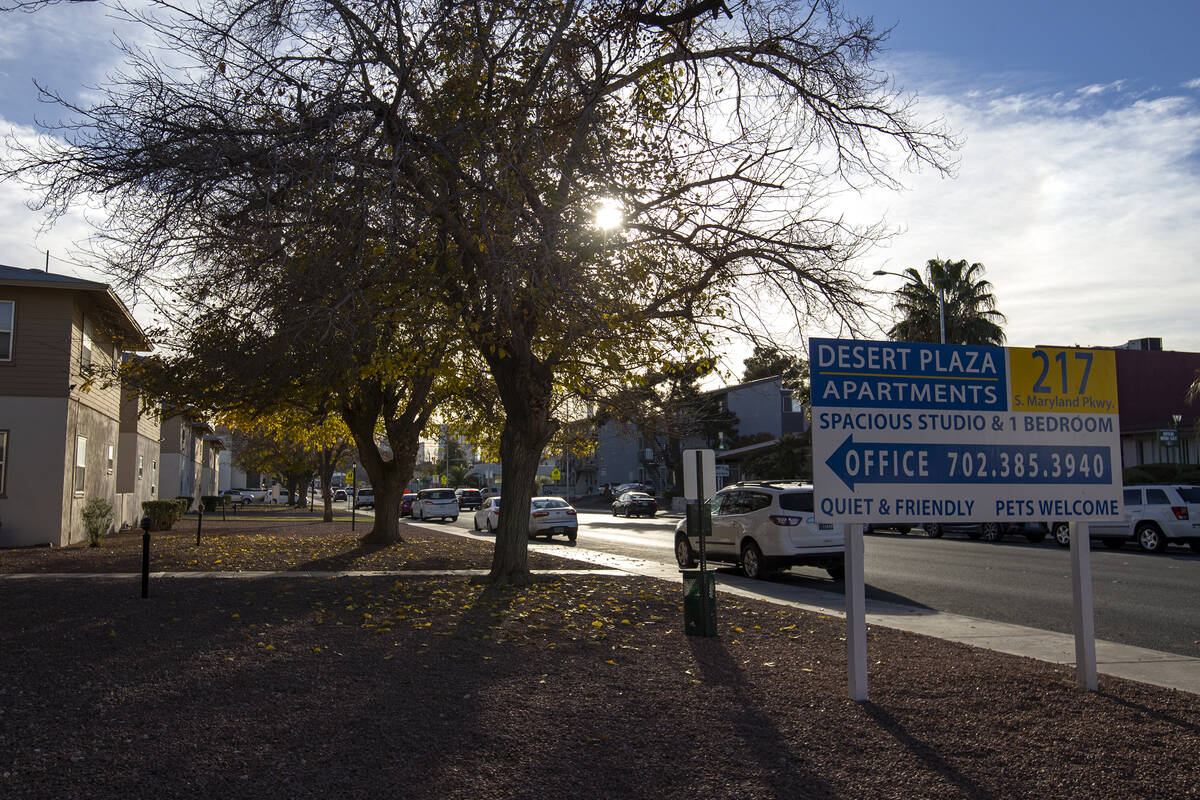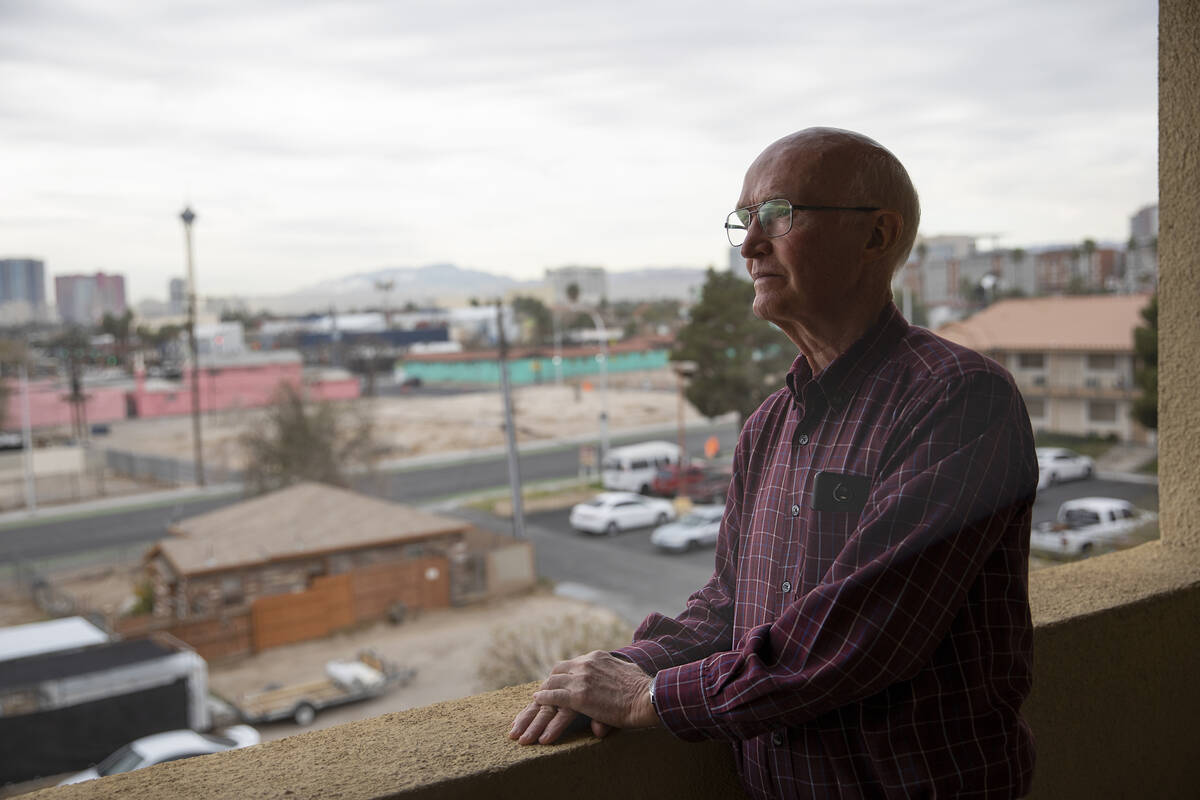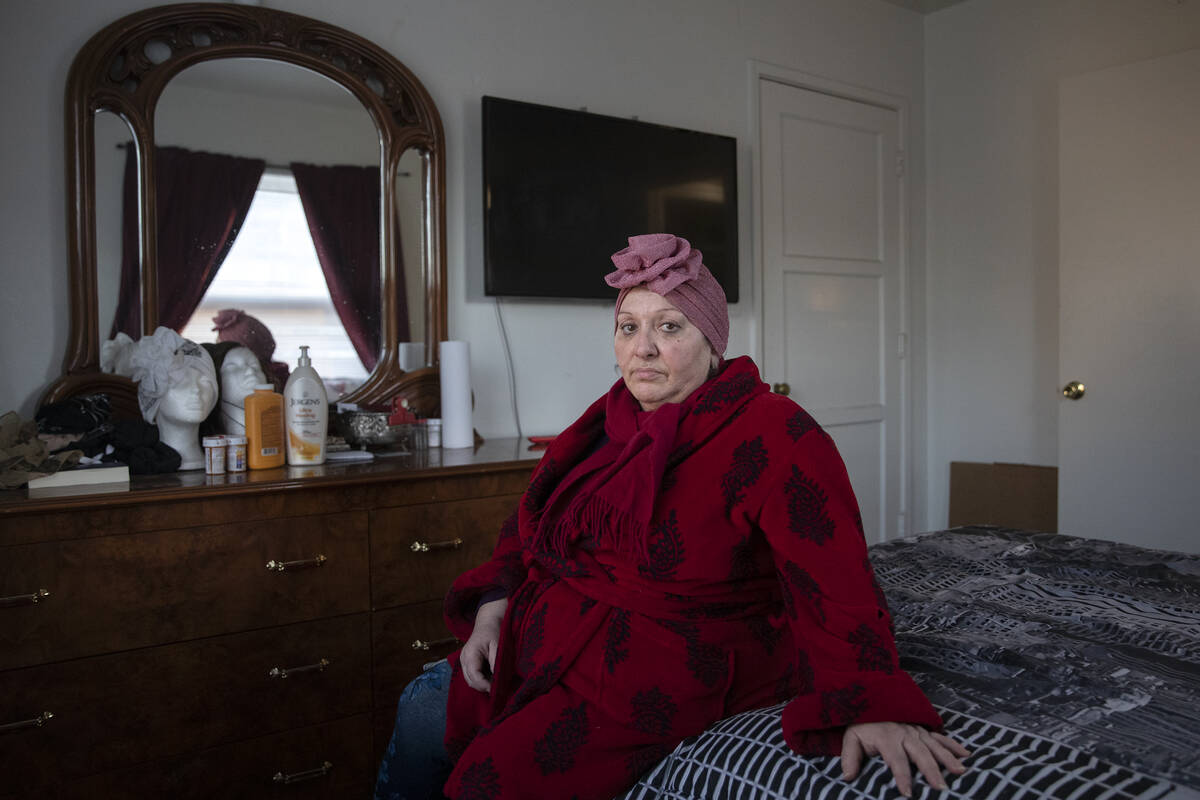These vulnerable seniors had found a home. Then rents went up.
Brenda Abrams, a former union steward who enjoys history, lives alone in a cluttered but decorative studio apartment in downtown Las Vegas, with a parakeet and Chihuahua terrier mix to keep her company.
Abrams, 69, said she suffered a pair of strokes prior to moving into the senior-living dwelling more than two years ago and she gets by on a fixed income as many seniors do. More important than living like someone “rich and famous,” however, is that she is simply able to afford somewhere to live at all.
The Desert Plaza Apartments had at least seemed to provide that comfort.
But after the multi-family housing complex was sold for $6.6 million in May, the new ownership stopped operating the site as senior apartments and increased rents dramatically, tenants say. It left cash-strapped residents scrambling to decide their next move, at least one on a collision course with eviction, and others with no choice but to seek somewhere else to live.
“Some didn’t say goodbye,” Abrams said. “I guess they didn’t have a chance to.”
As housing costs rise across the Las Vegas Valley, the situation confronting Abrams and her neighbors serves as a reminder that there is no protection from significant rent increases for most tenants in a state where affordable housing can be hard to find.
In this case, the tenants happen to all be seniors. But broadly, renters of all demographics throughout the region are worried about sharp upticks.
“There’s not a day goes by that someone’s not calling in and saying, ‘The landlord’s increasing our rent by so much,’” said attorney Ryan McConnell, with the Legal Aid Center of Southern Nevada. “‘Can they do this? What can I do about it?’”
In interviews with the Las Vegas Review-Journal, six current and former tenants at the Desert Plaza Apartments said they were shocked when presented with lease renewals that increased their rents by roughly 40 percent to more than 50 percent.
Abrams had been paying $530 in base rent through August 2020, when her first 12-month lease ended, according to a move-in statement, a cost that she said was manageable with nearly $1,100 in Social Security each month and with her son chipping in for food. By October, the cost jumped to $749, excluding any sewer, water and trash costs. If it rises significantly again, as she expects it will when her current six-month lease expires March 31, Abrams said she will be forced to move.
“You can raise our rent,” she said. “We’ll pay the rent, but make it affordable, something that won’t break us every month.”
No limits for most properties
In Nevada, rent-stabilizing regulations are in place for “affordable housing” in the technical sense of the term, which means for properties that were built or rehabilitated with government subsidies.
Otherwise there is no cap on how much a private landlord can increase rent with proper notice. Someone who would be hard-pressed to renew a lease that suddenly requires much or all of their income can try to negotiate the cost with the landlord, according to McConnell, who focuses on landlord-tenant issues. The prospect of reaching a compromise, particularly with long-term renters who consistently pay on time, is “not hopeless,” he said.
But three tenants, including Abrams, said their efforts to negotiate fell on deaf ears.
The Desert Plaza Apartments is not tied to any subsidies, according to state and city officials. In other words, the complex appears to have been naturally-occurring affordable housing, a term that simply describes residential properties that are affordable without mandates.
Las Vegas does not have a business license category for senior housing, according to city spokesman Jace Radke. Thus, lifting age restrictions, as long as government subsidies were not involved, would seem to be an informal move that is not tracked by the city. Tenants say they have already seen younger neighbors move in.
Seattle-based Integrated Property Management, which Clark County property records show purchased the Desert Plaza Apartments last spring, did not respond to multiple messages seeking to discuss the reasons behind the rent increases or plans for the complex, located on Maryland Parkway between Carson and Bridger avenues.
Lease renewal notifications to tenants have continued to use “Desert Plaza Senior Apartments” letterhead even after the sale, according to copies provided by residents. Language in the notices suggest that new rents are aligned with the current market.
“All this stuff stems from the fact that (the new owner) has every right to do what he wants to do. We all recognize that,” said Richard Campos, a longtime tenant. “But there’s got to be some sort of compassion, empathy for the people. He knows what he bought.”
‘Not the time to be greedy’
State lawmakers broached tenant protections in 2019 when a bill failed that would have allowed local governments to consider rent control measures, among other tactics, to increase the state’s affordable housing stock, which is more scarce in Nevada than in any other state in the U.S.
“We literally lead the way,” said Christine Hess, executive director of the Nevada Housing Coalition, who noted that there are only about 20 affordable units available for every 100 extremely low-income households searching for them. Preserving the existing portfolio remains an added challenge, she said.
Fears over rising rents were publicly reignited during a Clark County Commission meeting in September when Commissioner William McCurdy expressed frustration over a Nevada Association of Realtors newsletter sent out in August. One article was titled “Raise the Roof: No Rent Caps in Nevada” and offered legal insight into rental increases for landlords and property owners.
County lawmakers were presented during the Sept. 21 meeting with information about the affordability crisis gripping Southern Nevada: The typical rent in the Las Vegas metropolitan area was $1,591, up 20 percent from February 2020, according to County Human Services Administrator Tim Burch. Social Security recipients, however, had only seen increases of 1.6 and 1.3 percent in 2020 and 2021, respectively. McCurdy used the occasion to deliver a strong message to the industry.
“This is not the time to be greedy,” he said. “This is the time to show a little compassion and figure out how we’re going to keep people housed before we really have a crisis on our hands much more than we have right now.”
Nevada Realtors CEO Teresa McKee said in an interview that while the title “was probably not well thought out,” the newsletter article emphasized to property owners their responsibility to identify the balance between raising rents and aligning them with costs in the area and also weighing that against tenant turnover and long-term vacancies.
“We do our best, and have done our best throughout this whole pandemic, to encourage property managers to work with their tenants and recognize the difficulties that tenants are in, and to know the consequences of raising rents, which may not be more money in (property managers’) pockets, ultimately,” she said.
In a recent interview, McCurdy said the rent increases faced by residents at the Desert Plaza Apartments, although in city limits and outside the commission’s purview, were “precisely” the type of quandary he was concerned about.
“We’re in a very difficult situation between the rising cost of rents and a lot of our multi-family units, complexes that are mostly occupied by seniors,” he said. “Right now, it’s trending in the wrong direction. It’s becoming more unaffordable. It’s becoming more predatory.”
‘Too old to be out in the street’
Esther Stokes, 74, has lived at the Desert Plaza Apartments since 2004 and has faced unimaginable hardship: Her longtime partner, 74-year-old Serge Fournier, died after being pushed off a stopped bus three years ago in downtown Las Vegas, in a confrontation that was highly publicized.
Now Stokes, who receives $900 each month in Social Security benefits to cover a $600 rent, said she is confronting an unfeasible rent increase to $925 when her one-bedroom lease expires in May.
“I’m too old to be out in the street worrying about where I’m going to keep warm and how,” she said. “I don’t know what I’m going to do, but my attitude is God will make a way.”
Campos, 72, who was accustomed to incremental rent increases during two decades at the complex, said he had paid $615 in August 2020 but lamented that he will be saddled with a $925 payment starting this month. Inna Brez, 61 — who immigrated to the U.S. from Ukraine to flee war in 1990 — saw her one-bedroom rent similarly skyrocket from $630 in August 2020 to $799 one year later. It will jump again to $925 after February, according to a copy of her lease renewal notification, and Brez said she cannot afford it since it would absorb a vast majority of her $1,100 or so disability check.
Unable to pay rent, and unsuccessful in negotiating costs, Brez said she plans not to sign the lease and face eviction.
“So what’s going on with government and why government let landlord raise rent like $200?” she said from a home she shares with a cat named “Shorty,” who she rescued more than a decade ago while living in New York City. “I understand 2 percent, I understand 4 percent. It’s normal. Not $200, and the landlord knew this is senior community.”
Making matters worse, the tenants say, they are being exclusively offered six-month leases, stoking anxieties that rent hikes will come more frequently, leaving little time or ability to save money to move.
Old complex, concerns about heat
Susy Vasquez, the executive director of the Nevada State Apartment Association, said that investments made to upgrade older complexes can play a factor in pushing rents higher. The Desert Plaza Apartments was constructed in 1949, according to county property records, although it was unclear whether rent increases were tied to any planned improvements.
But tenants claimed that vacant apartments have been remodeled, while issues in occupied units remain unaddressed.
“If I got to give up my whole check for rent, it’s got to be better than this,” Stokes said.
Tenants complained of antiquated heating systems that were either broken, ineffective or cost too much to run, and problems with cockroaches and slow-moving maintenance. Many use personally purchased space heaters for warmth, a potentially precarious remedy underscored by a New York City apartment fire on Jan. 9, caused by a malfunctioning space heater, that killed 17 people. Brez, who is fighting stage 4 breast cancer, said her apartment has dipped to 40 degrees in the pre-dawn hours.
The building’s property management company, Advanced Management Group, which was retained after the sale, did not respond to multiple inquiries to discuss tenant complaints about rent and heat.
McConnell said that residents may provide a written notice to their landlord if an essential service such as heating or air conditioning is out, and by law a landlord has 48 hours to start the process to fix the issue. For nonessential services, like a leaky pipe or busted window screen, the timeline is 14 days.
A tenant can obtain a remedy elsewhere and deduct the cost from rent if a landlord fails to respond in a timely manner, McConnell added. Tenants said that they have submitted tickets with the apartment office but that issues persist.
City records show there was a quickly resolved complaint regarding a cockroach infestation at one unit in 2019 and another about lacking air conditioning the year prior, a case that was closed after the city could not reach the complainant. The complex failed a fire inspection in 2018 for needing to add or replace smoke alarms and then passed a subsequent checkup. But otherwise records do not indicate widespread problems.
City Councilwoman Olivia Diaz, who represents the district where the complex is located, could not be reached for comment on this story.
‘No easy answers’
McCurdy said the county was working on a program to subsidize the costs of rent increases for seniors. The initiative, which he said is intended to expand to other age demographics down the road, would be independent of its program that has doled out roughly $200 million in federal pandemic aid thus far to pay back-rent and utilities for tens of thousands of residents.
Government subsidies, however, are generally unsustainable.
Housing industry officials said that evidence has shown that rent control is ineffective in improving affordability. Vasquez said such measures, which have been adopted in a handful of states including New York and California, have proven to repel investors and would be harmful to fast-growing jurisdictions like Las Vegas. Even so, the city’s population boom has contributed to rising costs, which have even affected the federal Section 8 housing program to a smaller degree, she said.
Vasquez, whose organization represents more than 60 percent of valley rental property owners, said there needed to be more housing to better meet demand. McKee agreed.
“Now, there’s no easy answers, of course,” McKee said. “If there was an easy answer, we all would have figured it out.”
Hess acknowledged that increasing inventory could be part of a wide-ranging solution. But she said the problem requires an innovative strategy including, among other things, land-use policy, enticing the private market through incentives to build more actually affordable homes and earmarking COVID-19 pandemic recovery funds toward affordable housing.
“It’s going to take an army of Nevadans to say, ‘no you’re not going to squeeze us out of our communities,” said Quentin Savwoir, deputy director for Make It Work Nevada, a progressive advocacy group which he said is focused on tenant rights.
Savwoir said that as the city becomes more expensive, people get pushed out further away from resources. He said that state lawmakers need to give authority to local governments to regulate rents, although he noted that momentum for local control has largely waned since 2019.
During the legislative session last year, when summary evictions commanded much of the housing spotlight, state lawmakers expanded to 60 days the 45-day notice required by landlords to alert month-to-month tenants of a rent increase, according to McConnell.
Future interrupted
Meanwhile, seniors at the Desert Plaza Apartments, who say they live among 80 or so other units, face an unknown future and a looming loss of community. For Robert Strom, that loss has already been felt.
When Strom, 70, moved in nearly a decade ago after he retired, he said he thought it would be his last destination — a sentiment also expressed by current tenants.
But then he said he was told that his rent would increase from about $610 to $925 under a new lease, which seemed like a tough ask for someone who lives on a Social Security check of less than $1,200 a month. So he moved from the complex, which he described as tight-knit and peaceful.
“These aren’t apartments to us, these are our homes,” he said. “These were the last places we were going to live.”
Contact Shea Johnson at sjohnson@reviewjournal.com or 702-383-0272. Follow @Shea_LVRJ on Twitter. Contact Ricardo Torres-Cortez at rtorres@reviewjournal.com. Follow him on Twitter @rickytwrites. Review-Journal reporters Sabrina Schnur and Arthur Kane contributed to this report.



